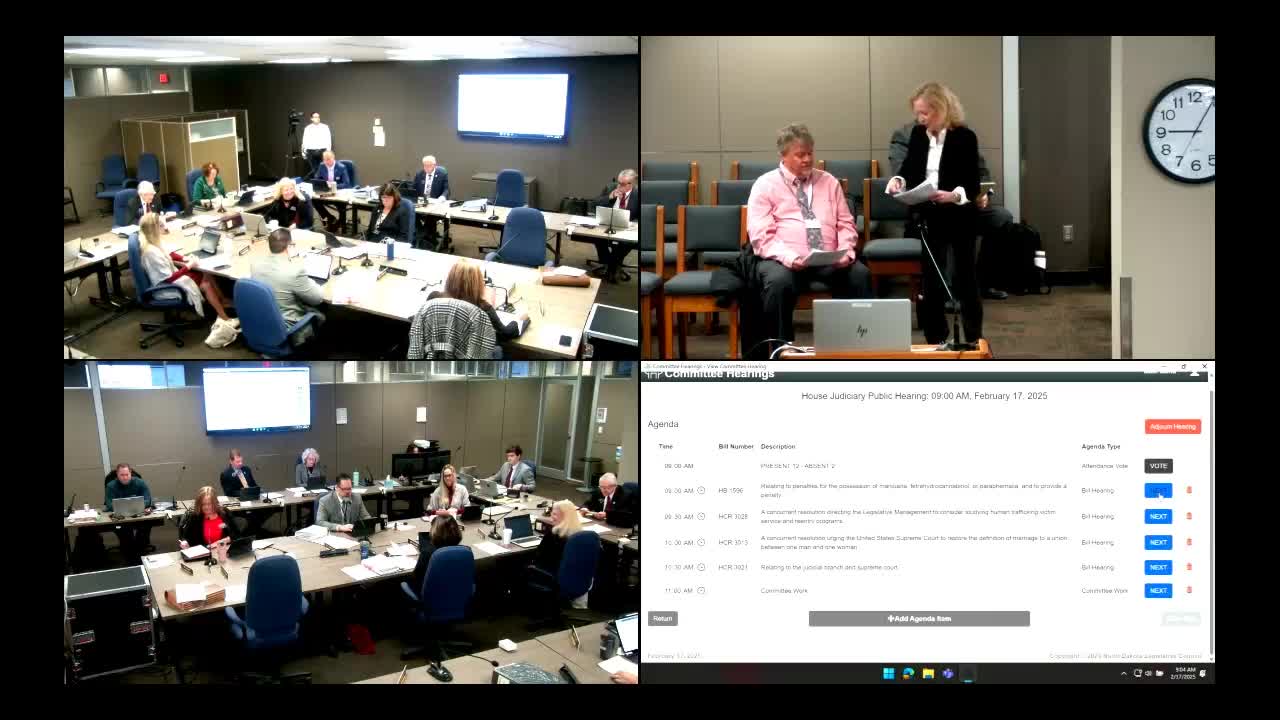Committee hears bill to convert lowest-level marijuana offenses to noncriminal citations
Get AI-powered insights, summaries, and transcripts
Subscribe
Summary
Representative Liz Conmey, sponsor of House Bill 1596, told the House Judiciary Committee that the bill responds to suggestions from state's attorneys and law enforcement around the state and would make the least serious marijuana possession offenses noncriminal citations for people 18 and older.
Representative Liz Conmey, sponsor of House Bill 1596, told the House Judiciary Committee that the bill responds to suggestions from state's attorneys and law enforcement around the state and would make the least serious marijuana possession offenses noncriminal citations for people 18 and older.
Conmey said the proposal aims to ease burdens on courts and prosecutors: "HB 15 96 makes the least of these marijuana offenses a noncriminal citation so that it's still a deterrent, but it takes some of the burden off of our law enforcement officers, our state's attorneys, our indigent defense attorneys, and the courts and the judges." She gave statewide case counts from Jan. 1, 2021, through Dec. 31, 2024: 8,676 marijuana charges, 7,365 cases opened, 17,000 hearings and 2,357 cases with a public defender appointed.
The bill would lower the adult ingestion age to 18, convert very small possession amounts to noncriminal citations, reclassify intermediate possession ranges as infractions and retain current Class A misdemeanor thresholds for larger amounts. Conmey said the measure also includes a sealing provision that would allow sealing a first possession conviction if no further convictions occur within two years, and an adjudication process for citations modeled on traffic adjudication with a $150 statutory fee.
Jonathan Byers, representing the North Dakota State's Attorneys Association, said prosecutors support the bill but recommended a targeted amendment: remove the words "up to" before the fee so the statute specifies a set $150 statutory fee rather than a judicially variable amount. "If part of the intent of this is to let somebody pay the statutory fee or forfeit bond, then it needs to be a set amount," Byers said.
Travis Fink, executive director of the North Dakota Commission on Legal Counsel for Indigence, testified in support, saying indigent defense caseloads and recruitment problems make measures that reduce court processing "common sense." He and Conmey also described amendments to keep juvenile offenses as infractions so juvenile court retains jurisdiction and records protections for minors.
Stephanie Ingebretsen, testifying for the Chiefs of Police Association of North Dakota, opposed the bill in its current form and urged the committee to preserve ratcheting deterrence for repeat offenders. She noted that under current law an infraction can carry fines up to $1,000 and that repeated infractions may escalate to misdemeanor consequences; she said converting the lowest-level conduct to a $150 noncriminal citation without clear escalation could reduce deterrence against repeat offending.
Committee members asked whether the bill included provisions that escalate penalties for repeated noncriminal citations; Conmey and staff indicated amendments drafted by the sponsor would address subsequent-offense escalations and that the sponsor would provide those amendments to the committee. The committee closed the hearing and left the record open for amendments and further consideration.
Ending: The committee did not vote on HB 1596 at the hearing. The sponsor indicated she would supply the drafted amendments and the committee signaled it expects to take action on the bill later in the week.
